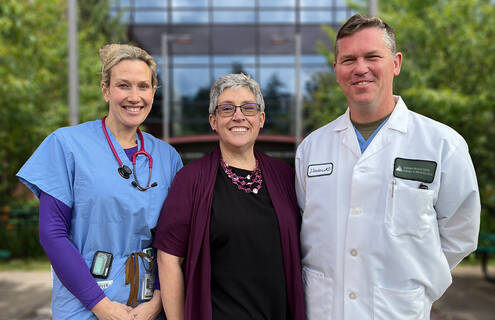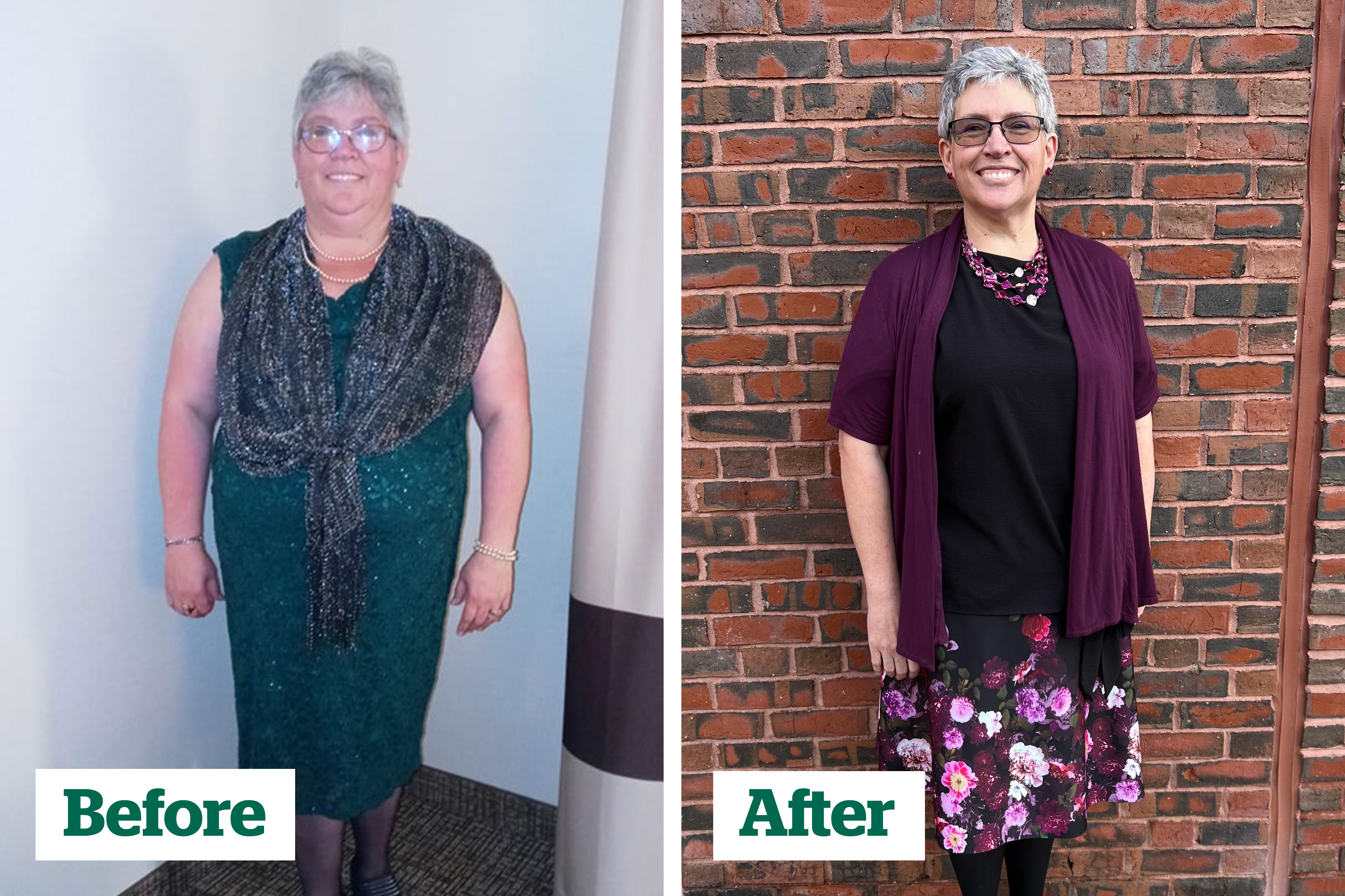
When I visit my older grandkids, we go on the trampoline, and I play and run around with them, and it's very cool. I really wish I had done this about 30 years ago. I would have taken on the world.
Tanya BrownTanya Brown calls it her “weight loss bucket list.”
After struggling with her weight for years, the list consists of must-do activities that she was too heavy, frightened, or uncomfortable to even think about attempting before she changed her life with bariatric weight loss surgery in May of 2022.
“I now have tons of energy, and I feel really good,” says Tanya, a 50-something grandmother of five from Hinsdale, who had gastric bypass surgery at Cheshire Medical Center. “These people have changed my life.”
Now, she has the energy and vigor to take on trampolines and zip lines — despite being terrified of heights — and is working her way up to skydiving and surfing.
“When I visit my older grandkids, we go on the trampoline, and I play and run around with them, and it's very cool. I really wish I had done this about 30 years ago. I would have taken on the world.”
Obesity is the second leading preventable cause of death in the United States — behind only smoking — and raises a patient’s risk for heart disease, stroke, type 2 diabetes, and some forms of cancer. While many obese people struggle with weight loss, bariatric surgery can often help them achieve and maintain a healthier weight and more active lifestyle.
Like many other patients, Tanya had wrestled with her weight for years, trying different diets and exercises, but she was still over 260 pounds and did not want to get any closer to 300. She learned about bariatric weight loss surgery from a cousin who underwent the procedure and was delighted to find she could get a referral close to home at Cheshire.
“Tanya is a rock star,” says J. Paul Sanders, MD, chair of the surgery department and head of the bariatric surgery team. “She was very eager and very motivated. She fits the same criteria as other patients in terms of weight, physiology, and age, but what sets her aside is her engagement with the program. She does everything right, she's very active, and it's turned her life around.”
“I love Cheshire; I absolutely adore it,” Tanya says. She had worked there once doing mental health support in the Emergency Department and had been treated there recently for COVID-19. She was excited to learn that Kate Ingram, MSN, APRN, a nurse practitioner who had cared for her when she had COVID and whom she really connected with, would be on her bariatric surgery team.
Tanya tells friends who think surgery is the easy way out that they're sadly mistaken. She knows that surgery was just one small part of her weight-loss journey, which would also require a lifelong commitment to a healthy lifestyle. She has had to exercise regularly, limit her meals, avoid sugary and fatty foods, and cut out sodas and alcohol entirely. However, her healthcare team provided the methods for her to be successful. She says, “They were realistic about the whole thing and gave me all the tools I needed to do the work.”

“When I look at Tanya, she's like an evangelical,” says Ingram, who also had life-changing bariatric surgery years ago. “She's preaching the good word about how hard it was, but how rewarding it was, how it changes you from head to toe. Somebody like Tanya spreads her good news in a good way, and it is a life-saving surgery for so many people.”
The same year Tanya had her surgery, she lost her 26-year-old daughter to a fentanyl overdose. Despite the terrible grief and sadness she experienced, focusing on her weight-loss journey kept her grounded and moving forward.
“I was grateful to have the goal of getting to my surgery as a way to help me cope with the grief,” Tanya says. “Being able to shop for an entire new wardrobe didn't hurt my feelings either. My daughter would have been proud of me. And now I feel like I’m healthier to be around for her kids.”
Even before her surgery, with the support of her team, family, and friends, Tanya had adjusted her diet and increased her physical activities to the point where she had lost more than 10 percent of her weight. She learned how to make exercise fun, counting her steps with a Fitbit and using the GPS tracker to make loopy designs out of her walks. She enjoyed virtual marathons, earning medals for activities such as walking the equivalent length of the Florida Keys or Yellowstone National Park.
“The Fitbit keeps me honest,” Tanya says. “And all my friends were so gung-ho. They're like, ‘You can do this!’ On the days I don't really feel like going for a walk at lunch, they remind me that I will feel much better if I do.”
While there have been many challenges and adjustments for Tanya, the payoff since her surgery has been huge. She enjoys kayaking, camping, swimming with her husband, and practicing yoga. A year after her surgery, she did a handstand and proudly sent a picture to her team at Cheshire.
Despite Tanya’s progress, her hard work is not over. She had multiple meetings with her team over the first year, including labwork, to make sure she was still on track and getting the most out of her surgery, and she will continue to meet with them annually for the rest of her life. But the real work is something only she can do.
“Seeing the doctor and getting blood work every year is the easy part,” Ingram says. “The hard part is the self-care, the exercise, the dietary adjustments. It’s relating to the girlfriends that you love, but the only thing you ever did together was to go out and get frappes. What do you do at Thanksgiving when everyone is eating like it's a freaking Olympic event?"
“Bariatric patients who are successful, like Tanya, recognize it's not a silver bullet,” Sanders says. “Being heavy is as if you've dug yourself into a hole. Surgery can help you get out of the hole, but you can always dig another hole. It's going to help you, but it's not going to do all the work for you, especially not in the long term. During that period when the surgery is helping you, it's important to change your habits."
Tanya attributes her success to the support of her family, friends, and her team at Cheshire. Everyone from the bariatric coordinator, nutritionist, and post-op nurses who cared for her was “professional, but kind and caring” and “super-duper knowledgeable.” She is grateful to have such a robust program right in her local community.
“I recommend Cheshire to all of my people,” she says. “I could not have been happier with the care I received. My husband was also impressed with how they took care of me and answered all his questions because it's not just about me but my family, too. Everybody that I know has been super supportive. I think I'm really lucky that I have a family and friends that are really great with the whole thing.”
If you or someone you love has ever thought about bariatric weight loss surgery, click here for information about signing up for a free information session.